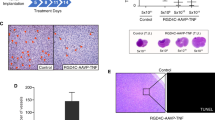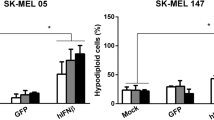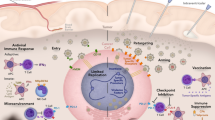Abstract
We investigated the feasibility of local treatment or tumor vaccination with a herpes simplex virus (HSV) type 1-defective vector. The vector was engineered to express murine interferon-γ (IFN-γ) for experimental gene therapy against mouse glioma Rous sarcoma virus (RSV). The murine IFN-γ gene was driven by the cytomegalovirus promoter. The helper virus (tsk) was thermosensitive; consequently, this vector could only proliferate at 31°C. A high level of murine IFN-γ expression was confirmed in vitro and in vivo by immunohistochemistry using anti-mouse IFN-γ monoclonal antibody. This engineered vector (dvHSV/MuIFN-γ) inhibited the proliferation of mouse glioma RSV cells in vitro, and an intratumoral (i.t.) local injection of the vector caused i.t. necrosis in vivo. The immunological effect of dvHSV/MuIFN-γ was also examined in a mouse glioma RSV cell implantation model. A subcutaneous (s.c.) implant of 1 × 106 mouse glioma RSV cells after treatment with dvHSV/MuIFN-γ was rejected. However, the implant after treatment with an engineered HSV-defective vector containing an antisense nucleotide sequence of the murine IFN-γ gene was not rejected. In addition, in another group of mice in which RSV cells treated with dvHSV/MuIFN-γ were implanted into a femoral (s.c.) region and nontreated RSV cells were implanted into a contralateral femoral (s.c.) region, the implanted RSV cells were rejected. The rejection of the implanted mouse glioma RSV was blocked by anti-asialo GM1, which was known to inhibit natural killer cell activity. These results revealed that the HSV-defective vector could realize a high efficiency of transfection to glioma cells through short-time treatment, and that the IFN-γ gene transferred to the cells had the effect of tumor vaccination, which was suggested be related to natural killer cells. In conclusion, dvHSV/MuIFN-γ may be useful for the gene therapy of malignant glioma through either i.t. local injection or a practical tumor vaccination with ex vivo gene transfer.
This is a preview of subscription content, access via your institution
Access options
Subscribe to this journal
Receive 12 print issues and online access
$259.00 per year
only $21.58 per issue
Buy this article
- Purchase on Springer Link
- Instant access to full article PDF
Prices may be subject to local taxes which are calculated during checkout
Similar content being viewed by others
Author information
Authors and Affiliations
Corresponding author
Rights and permissions
About this article
Cite this article
Kanno, H., Hattori, S., Sato, H. et al. Experimental gene therapy against subcutaneously implanted glioma with a herpes simplex virus-defective vector expressing interferon-γ. Cancer Gene Ther 6, 147–155 (1999). https://doi.org/10.1038/sj.cgt.7700008
Received:
Accepted:
Published:
Issue Date:
DOI: https://doi.org/10.1038/sj.cgt.7700008
Keywords
This article is cited by
-
Gene therapy in interventional pulmonology: Interferon gene delivery with focus on thoracic malignancies
Current Respiratory Care Reports (2012)
-
Targeting of products of genes to tumor sites using adoptively transferred A-NK and T-LAK cells
Cancer Gene Therapy (2007)
-
Herpes simplex virus 1 (HSV-1) for cancer treatment
Cancer Gene Therapy (2006)
-
The treatment of established intracranial tumors by in situ retroviral IFN-γ transfer
Gene Therapy (2000)



